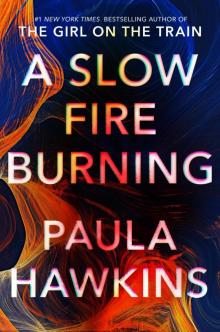- Home
- Paula Hawkins
The Girl on the Train Page 9
The Girl on the Train Read online
Page 9
“I don’t see—”
“What this has to do with Megan Hipwell?” Riley finished my sentence. “Well. The night Megan went missing, we have reports that you—an unstable woman who had been drinking heavily—were seen on the street where she lives. Bearing in mind that there are some physical similarities between Megan and Mrs. Watson—”
“They don’t look anything like each other!” I was outraged at the suggestion. Jess is nothing like Anna. Megan is nothing like Anna.
“They’re both blond, slim, petite, pale-skinned . . .”
“So I attacked Megan Hipwell thinking she was Anna? That’s the most stupid thing I’ve ever heard,” I said. But that lump on my head was throbbing again, and everything from Saturday night was still deepest black.
“Did you know that Anna Watson knows Megan Hipwell?” Gaskill asked me, and I felt my jaw drop.
“I . . . what? No. No, they don’t know each other.”
Riley smiled for a moment, then straightened her face. “Yes they do. Megan did some childminding for the Watsons . . .” She glanced down at her notes. “Back in August and September last year.”
I don’t know what to say. I can’t imagine it: Megan in my home, with her, with her baby.
“The cut on your lip, is that from when you got knocked down the other day?” Gaskill asked me.
“Yes. I bit it when I fell, I think.”
“Where was it, this accident?”
“It was in London, Theobalds Road. Near Holborn.”
“And what were you doing there?”
“I’m sorry?”
“Why were you in central London?”
I shrugged. “I already told you,” I said coldly. “My flatmate doesn’t know that I’ve lost my job. So I go into London, as usual, and I go to libraries, to job hunt, to work on my CV.”
Riley shook her head, in disbelief perhaps, or wonder. How does anyone get to that point?
I pushed my chair back, readying myself to leave. I’d had enough of being talked down to, being made to look like a fool, like a madwoman. Time to play the trump card. “I don’t really know why we’re talking about this,” I said. “I would have thought that you would have better things to do, like investigating Megan Hipwell’s disappearance, for example. I take it you’ve spoken to her lover?” Neither of them said anything, they just stared at me. They weren’t expecting that. They didn’t know about him. “Perhaps you didn’t know. Megan Hipwell was having an affair,” I said, and I started to walk to the door. Gaskill stopped me; he moved quietly and surprisingly quickly, and before I could put my hand on the door handle he was standing in front of me.
“I thought you didn’t know Megan Hipwell,” he said.
“I don’t,” I said, trying to get past him.
“Sit down,” he said, blocking my path.
I told them then about what I’d seen from the train, about how I often saw Megan sitting out on her terrace, sunbathing in the evenings or having coffee in the mornings. I told them about how last week I saw her with someone who clearly wasn’t her husband, how I’d seen them kissing on the lawn.
“When was this?” Gaskill snapped. He seemed annoyed with me, perhaps because I should have told them this straightaway, instead of wasting all day talking about myself.
“Friday. It was Friday morning.”
“So the day before she went missing, you saw her with another man?” Riley asked me with a sigh of exasperation. She closed the file in front of her. Gaskill leaned back in his seat, studying my face. She clearly thought I was making it up; he wasn’t so sure.
“Can you describe him?” Gaskill asked.
“Tall, dark—”
“Handsome?” Riley interrupted.
I puffed my cheeks out. “Taller than Scott Hipwell. I know, because I’ve seen them together—Jess and—sorry, Megan and Scott Hipwell—and this man was different. Slighter, thinner, darker-skinned. Possibly an Asian man,” I said.
“You could determine his ethnic group from the train?” Riley said. “Impressive. Who is Jess, by the way?”
“I’m sorry?”
“You mentioned Jess a moment ago.”
I could feel my face flushing again. I shook my head, “No, I didn’t,” I said.
Gaskill got to his feet and held out his hand for me to shake. “I think that’s enough.” I shook his hand, ignored Riley and turned to go. “Don’t go anywhere near Blenheim Road, Ms. Watson,” Gaskill said. “Don’t contact your ex-husband unless it’s important, and don’t go anywhere near Anna Watson or her child.”
On the train on the way home, as I dissect all the ways that today went wrong, I’m surprised by the fact that I don’t feel as awful as I might do. Thinking about it, I know why that is: I didn’t have a drink last night, and I have no desire to have one now. I am interested, for the first time in ages, in something other than my own misery. I have purpose. Or at least, I have a distraction.
THURSDAY, JULY 18, 2013
MORNING
I bought three newspapers before getting onto the train this morning: Megan has been missing for four days and five nights, and the story is getting plenty of coverage. The Daily Mail, predictably, has managed to find pictures of Megan in her bikini, but they’ve also done the most detailed profile I’ve seen of her so far.
Born Megan Mills in Rochester in 1983, she moved with her parents to King’s Lynn in Norfolk when she was ten. She was a bright child, very outgoing, a talented artist and singer. A quote from a school friend says she was “a good laugh, very pretty and quite wild.” Her wildness seems to have been exacerbated by the death of her brother, Ben, to whom she was very close. He was killed in a motorcycle accident when he was nineteen and she fifteen. She ran away from home three days after his funeral. She was arrested twice—once for theft and once for soliciting. Her relationship with her parents, the Mail informs me, broke down completely. Both her parents died a few years ago, without ever being reconciled with their daughter. (Reading this, I feel desperately sad for Megan. I realize that perhaps, after all, she isn’t so different from me. She’s isolated and lonely, too.)
When she was sixteen, she moved in with a boyfriend who had a house near the village of Holkham in north Norfolk. The school friend says, “He was an older guy, a musician or something. He was into drugs. We didn’t see Megan much after they got together.” The boyfriend’s name is not given, so presumably they haven’t found him. He might not even exist. The school friend might be making this stuff up just to get her name into the papers.
They skip forward several years after that: suddenly Megan is twenty-four, living in London, working as a waitress in a North London restaurant. There she meets Scott Hipwell, an independent IT contractor who is friendly with the restaurant manager, and the two of them hit it off. After an “intense courtship,” Megan and Scott marry, when she is twenty-six and he is thirty.
There are a few other quotes, including one from Tara Epstein, the friend with whom Megan was supposed to stay on the night she disappeared. She says that Megan is “a lovely, carefree girl” and that she seemed “very happy.” “Scott would not have hurt her,” Tara says. “He loves her very much.” There isn’t a thing Tara says that isn’t a cliché. The quote that interests me is from one of the artists who exhibited his work in the gallery Megan used to manage, one Rajesh Gujral, who says that Megan is “a wonderful woman, sharp, funny and beautiful, an intensely private person with a warm heart.” Sounds to me like Rajesh has got a crush. The only other quote comes from a man called David Clark, “a former colleague” of Scott’s, who says, “Megs and Scott are a great couple. They’re very happy together, very much in love.”
There are some news pieces about the investigation, too, but the statements from the police amount to less than nothing: they have spoken to “a number of witnesses,” they are “pursuing several lines of enquiry.” The only interesting com
ment comes from Detective Inspector Gaskill, who confirms that two men are helping the police with their enquiries. I’m pretty sure that means they’re both suspects. One will be Scott. Could the other be B? Could B be Rajesh?
I’ve been so engrossed in the newspapers that I haven’t been paying my usual attention to the journey; it seems as though I’ve only just sat down when the train grinds to its customary halt opposite the red signal. There are people in Scott’s garden—there are two uniformed police just outside the back door. My head swims. Have they found something? Have they found her? Is there a body buried in the garden or shoved under the floorboards? I can’t stop thinking of the clothes on the side of the railway line, which is stupid, because I saw those there before Megan went missing. And in any case, if harm has been done to her, it wasn’t by Scott, it can’t have been. He’s madly in love with her, everyone says so. The light is bad today, the weather’s turned, the sky leaden, threatening. I can’t see into the house, I can’t see what’s going on. I feel quite desperate. I cannot stand being on the outside—for better or worse, I am a part of this now. I need to know what’s going on.
At least I have a plan. First, I need to find out if there’s any way that I can be made to remember what happened on Saturday night. When I get to the library, I plan to do some research and find out whether hypnotherapy could make me remember, whether it is in fact possible to recover that lost time. Second—and I believe this is important, because I don’t think the police believed me when I told them about Megan’s lover—I need to get in touch with Scott Hipwell. I need to tell him. He deserves to know.
EVENING
The train is full of rain-soaked people, steam rising off their clothes and condensing on the windows. The fug of body odour, perfume and laundry soap hangs oppressively above bowed, damp heads. The clouds that menaced this morning did so all day, growing heavier and blacker until they burst, monsoon-like, this evening, just as office workers stepped outside and the rush hour began in earnest, leaving the roads gridlocked and tube station entrances choked with people opening and closing umbrellas.
I don’t have an umbrella and am soaked through; I feel as though someone has thrown a bucket of water over me. My cotton trousers cling to my thighs and my faded blue shirt has become embarrassingly transparent. I ran all the way from the library to the tube station with my handbag clutched against my chest to hide what I could. For some reason I found this funny—there is something ridiculous about being caught in the rain—and I was laughing so hard by the time I got to the top of Gray’s Inn Road, I could barely breathe. I can’t remember the last time I laughed like that.
I’m not laughing now. As soon as I got myself a seat, I checked the latest on Megan’s case on my phone, and it’s the news I’ve been dreading. “A thirty-four-year-old man is being questioned under caution at Witney police station regarding the disappearance of Megan Hipwell, missing from her home since Saturday evening.” That’s Scott, I’m sure of it. I can only hope that he read my email before they picked him up, because questioning under caution is serious—it means they think he did it. Although, of course, it is yet to be defined. It may not have happened at all. Megan might be fine. Every now and again it does strike me that she’s alive and well and sitting on a hotel balcony with a view of the sea, her feet up on the railings, a cold drink at her elbow.
The thought of her there both thrills and disappoints me, and then I feel sick for feeling disappointed. I don’t wish her ill, no matter how angry I was with her for cheating on Scott, for shattering my illusions about my perfect couple. No, it’s because I feel like I’m part of this mystery, I’m connected. I am no longer just a girl on the train, going back and forth without point or purpose. I want Megan to turn up safe and sound. I do. Just not quite yet.
I sent Scott an email this morning. His address was easy to find—I Googled him and found www.shipwellconsulting.co.uk, the site where he advertises “a range of consultancy, cloud- and web-based services for business and nonprofit organizations.” I knew it was him, because his business address is also his home address.
I sent a short message to the contact address given on the site:
Dear Scott,
My name is Rachel Watson. You don’t know me. I would like to talk to you about your wife. I do not have any information on her whereabouts, I don’t know what has happened to her. But I believe I have information that could help you.
You may not want to talk to me, I would understand that, but if you do, email me on this address.
Yours sincerely,
Rachel
I don’t know if he would have contacted me anyway—I doubt that I would, if I were in his shoes. Like the police, he’d probably just think I’m a nutter, some weirdo who’s read about the case in the newspaper. Now I’ll never know—if he’s been arrested, he may never get a chance to see the message. If he’s been arrested, the only people who see it may be the police, which won’t be good news for me. But I had to try.
And now I feel desperate, thwarted. I can’t see through the mob of people in the carriage across to their side of the tracks—my side—and even if I could, with the rain still pouring down I wouldn’t be able to see beyond the railway fence. I wonder whether evidence is being washed away, whether right at this moment vital clues are disappearing forever: smears of blood, footprints, DNA-loaded cigarette butts. I want a drink so badly, I can almost taste the wine on my tongue. I can imagine exactly what it will feel like for the alcohol to hit my bloodstream and make my head rush.
I want a drink and I don’t want one, because if I don’t have a drink today then it’ll be three days, and I can’t remember the last time I stayed off for three days in a row. There’s a taste of something else in my mouth, too, an old stubbornness. There was a time when I had willpower, when I could run 10k before breakfast and subsist for weeks on thirteen hundred calories a day. It was one of the things Tom loved about me, he said: my stubbornness, my strength. I remember an argument, right at the end, when things were about as bad as they could be; he lost his temper with me. “What happened to you, Rachel?” he asked me. “When did you become so weak?”
I don’t know. I don’t know where that strength went, I don’t remember losing it. I think that over time it got chipped away, bit by bit, by life, by the living of it.
The train comes to an abrupt halt, brakes screeching alarmingly, at the signal on the London side of Witney. The carriage is filled with murmured apologies as standing passengers stumble, bumping into one another, stepping on one another’s feet. I look up and find myself looking right into the eyes of the man from Saturday night—the ginger one, the one who helped me up. He’s staring right at me, his startlingly blue eyes locked on mine, and I get such a fright, I drop my phone. I retrieve it from the floor and look up again, tentatively this time, not directly at him. I scan the carriage, I wipe the steamy window with my elbow and stare out, and then eventually I look back over at him and he smiles at me, his head cocked a little to one side.
I can feel my face burning. I don’t know how to react to his smile, because I don’t know what it means. Is it Oh, hello, I remember you from the other night, or is it Ah, it’s that pissed girl who fell down the stairs and talked shit at me the other night, or is it something else? I don’t know, but thinking about it now, I believe I have a snatch of sound track to go with the picture of me slipping on the steps: him saying, “You all right, love?” I turn away and look out of the window again. I can feel his eyes on me; I just want to hide, to disappear. The train judders off, and in seconds we’re pulling into Witney station and people start jostling one another for position, folding newspapers and packing away tablets and e-readers as they prepare to disembark. I look up again and am flooded with relief—he’s turned away from me, he’s getting off the train.
It strikes me then that I’m being an idiot. I should get up and follow him, talk to him. He can tell me what happened, or what didn’t happen
; he might be able to fill in some of the blanks at least. I get to my feet. I hesitate—I know it’s already too late, the doors are about to close, I’m in the middle of the carriage, I won’t be able to push my way through the crowd in time. The doors beep and close. Still standing, I turn and look out of the window as the train pulls away. He’s standing on the edge of the platform in the rain, the man from Saturday night, watching me as I go past.
The closer I get to home, the more irritated with myself I feel. I’m almost tempted to change trains at Northcote, go back to Witney and look for him. A ridiculous idea, obviously, and stupidly risky given that Gaskill warned me to stay away from the area only yesterday. But I’m feeling dispirited about ever recalling what happened on Saturday. A few hours of (admittedly hardly exhaustive) Internet research this afternoon confirmed what I suspected: hypnosis is not generally useful in retrieving hours lost to blackout because, as my previous reading suggested, we do not make memories during blackout. There is nothing to remember. It is, will always be, a black hole in my timeline.
MEGAN
• • •
THURSDAY, MARCH 7, 2013
AFTERNOON
The room is dark, the air close, sweet with the smell of us. We’re at the Swan again, in the room under the eaves. It’s different, though, because he’s still here, watching me.
“Where do you want to go?” he asks me.
“A house on the beach on the Costa de la Luz,” I tell him.
He smiles. “What will we do?”
I laugh. “You mean apart from this?”
His fingers are tracing slowly over my belly. “Apart from this.”
“We’ll open a café, show art, learn to surf.”
He kisses me on the tip of my hip bone. “What about Thailand?” he says.
I wrinkle my nose. “Too many gap-year kids. Sicily,” I say. “The Egadi islands. We’ll open a beach bar, go fishing . . .”

 Girl on the Train
Girl on the Train The Girl on the Train
The Girl on the Train Into the Water
Into the Water A Slow Fire Burning
A Slow Fire Burning